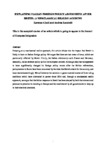Explaining Italian foreign policy adjustment after Brexit: a Neoclassical realist account
| dc.contributor.author | Cladi, Lorenzo | |
| dc.contributor.author | Locatelli, A | |
| dc.date.accessioned | 2020-05-27T11:56:12Z | |
| dc.date.issued | 2020-07-30 | |
| dc.identifier.issn | 0703-6337 | |
| dc.identifier.issn | 1477-2280 | |
| dc.identifier.other | 1800676 | |
| dc.identifier.uri | http://hdl.handle.net/10026.1/15708 | |
| dc.description.abstract |
Drawing on a neoclassical realist approach, this article delves into the impact that Brexit is likely to have on Italian foreign policy. We argue that there are two areas of issue, which are particularly affected by Brexit. Firstly, the Italian relationship with France and Germany. Secondly, the Italian defence policy within the European context. Although Italy has not appeared to have significantly changed its foreign policy course after the British referendum, policymakers in Rome have been concerned by the risks that Brexit entails for the country, and have reacted accordingly. We will observe the variation in governmental interest of three ruling coalitions which have alternated in power since 2016 and, through a neoclassical realist approach, we argue that the Italian response to Brexit has been shaped by both the international pressure to preserve its standing in Europe and the need shared by all governments to keep up to their electoral promises. | |
| dc.format.extent | 0-0 | |
| dc.language | en | |
| dc.language.iso | en | |
| dc.publisher | Taylor & Francis (Routledge) | |
| dc.subject | Brexit | |
| dc.subject | Italian foreign policy | |
| dc.subject | neoclassical realism | |
| dc.subject | security | |
| dc.title | Explaining Italian foreign policy adjustment after Brexit: a Neoclassical realist account | |
| dc.type | journal-article | |
| dc.type | Journal Article | |
| plymouth.author-url | https://www.webofscience.com/api/gateway?GWVersion=2&SrcApp=PARTNER_APP&SrcAuth=LinksAMR&KeyUT=WOS:000555239900001&DestLinkType=FullRecord&DestApp=ALL_WOS&UsrCustomerID=11bb513d99f797142bcfeffcc58ea008 | |
| plymouth.issue | 4 | |
| plymouth.volume | 0 | |
| plymouth.publication-status | Published | |
| plymouth.journal | Journal of European Integration | |
| dc.identifier.doi | 10.1080/07036337.2020.1800676 | |
| plymouth.organisational-group | /Plymouth | |
| plymouth.organisational-group | /Plymouth/Faculty of Arts, Humanities and Business | |
| plymouth.organisational-group | /Plymouth/Faculty of Arts, Humanities and Business/School of Society and Culture | |
| plymouth.organisational-group | /Plymouth/REF 2021 Researchers by UoA | |
| plymouth.organisational-group | /Plymouth/REF 2021 Researchers by UoA/UoA20 Social Work and Social Policy | |
| plymouth.organisational-group | /Plymouth/Users by role | |
| plymouth.organisational-group | /Plymouth/Users by role/Academics | |
| dcterms.dateAccepted | 2020-05-25 | |
| dc.rights.embargodate | 2022-1-30 | |
| dc.identifier.eissn | 1477-2280 | |
| dc.rights.embargoperiod | Not known | |
| rioxxterms.versionofrecord | 10.1080/07036337.2020.1800676 | |
| rioxxterms.licenseref.uri | http://www.rioxx.net/licenses/all-rights-reserved | |
| rioxxterms.licenseref.startdate | 2020-07-30 | |
| rioxxterms.type | Journal Article/Review |


